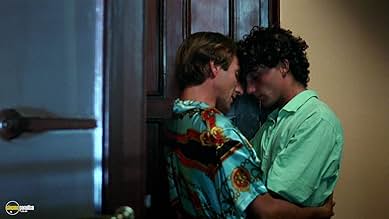NOTE IMDb
7,1/10
15 k
MA NOTE
Un réalisateur homosexuel se lie avec une fan obsessionnelle tout en se languissant de son grand amour absent. Parallèlement, il partage une relation étroite mais complexe avec sa sœur trans... Tout lireUn réalisateur homosexuel se lie avec une fan obsessionnelle tout en se languissant de son grand amour absent. Parallèlement, il partage une relation étroite mais complexe avec sa sœur transgenre, une actrice.Un réalisateur homosexuel se lie avec une fan obsessionnelle tout en se languissant de son grand amour absent. Parallèlement, il partage une relation étroite mais complexe avec sa sœur transgenre, une actrice.
- Réalisation
- Scénario
- Casting principal
- Récompenses
- 10 victoires et 3 nominations au total
Fernando Guillén
- Inspector de policía
- (as Fernando Guillen)
Nacho Martínez
- Doctor Martín
- (as Nacho Martinez)
Bibiana Fernández
- Ada - madre
- (as Bibi Andersen)
Rossy de Palma
- Locutora tele.
- (as Rosy Von Donna)
Avis à la une
In what has now customarily become known as the New Queer Cinema, Almodovar's "Law of Desire" must be seen as a landmark film. Opening with a naked man masturbating and being guided through the motions by the disembodied voice of 'the director', this turns out to be something of a red-herring, though it does establish that the film's central character is a director, (Almodovar?), and that he is gay. What follows is a teasing Hitchcockain menage-a-trois murder yarn, (not mystery), in which the homosexuality of the protagonists is very much to the fore and is hardly seen as 'an issue', (a major breakthrough in what was a mainstream Spanish movie of its day). Indeed "Law of Desire" was the film which really established Almodovar internationally and while gay-themed movies were finally making their mark in 1987 few were quite as explicitly erotic or as pleasurably in-your-face as this.
Its cast was largely made up of what only be described as players from Almodovar's stock company and in a fine cast Antonio Banderas and Carmen Maura are the stand-outs; he as a pathologically disturbed 'fan' whose obsession with Eusebio Puncela's director leads to murder and she as the director's transsexual 'sister', a deliriously giddy performance and yet played mostly 'straight' by Maura.
If not quite as deep as Almodovar's later movies there is nevertheless much to enjoy here, (and although dealing with tragic issues Almodovar teases out the black comedy for all its worth). Now, of course, a great deal of the fun is in slotting the film into the Almodovar canon and seeing exactly where it fits in relation to the movies that followed it.
Its cast was largely made up of what only be described as players from Almodovar's stock company and in a fine cast Antonio Banderas and Carmen Maura are the stand-outs; he as a pathologically disturbed 'fan' whose obsession with Eusebio Puncela's director leads to murder and she as the director's transsexual 'sister', a deliriously giddy performance and yet played mostly 'straight' by Maura.
If not quite as deep as Almodovar's later movies there is nevertheless much to enjoy here, (and although dealing with tragic issues Almodovar teases out the black comedy for all its worth). Now, of course, a great deal of the fun is in slotting the film into the Almodovar canon and seeing exactly where it fits in relation to the movies that followed it.
I saw this film after having seen Bad Education, and there are many plot lines similar in both. I loved this film, not only am I a huge fan of Almodóvar, but in this film, the easy and simple beauty of the shots stood out. The acting was good, not amazing but good, particularly from Pablo and Tina. As well as directing beautifully, Almodóvar knows how to infuse a scene with sex, even if no sex is actually taking place-for example, when Antonio lights his cigarette of Pablo's. The film does become melodramatic towards the end, but I don't see this as a failing, melodrama, if done well, as it is here, need not be ridiculous
The most significant aspect of The Law of Desire is the fact that it was so accepted in Spain at the time of its release. It was put forward by the authorities as the movie to represent the country in 1987. Bearing in mind that Spain had only come out of a fascist dictatorship not much more than a decade earlier, this simple fact is a testament to how far the country had moved on in such a short period of time. The reason for this is that this is an unashamedly gay themed film, one that celebrates homosexuality and depicts it without issue.
The film itself is about a love triangle between three men. Like several other Pedro Almodóvar films it's a melodrama with thriller elements. It features an extremely daring performance by Antonio Banderas in a role where he is required to perform in some full-on gay love scenes. These moments made the film front page news in Spain but it did nothing to stop Banderas subsequent rise to stardom. For me, however, this is a middling movie. It's not amongst the director's best. In my view, its interest lies more in its historical significance as opposed to it's worth as a film.
The film itself is about a love triangle between three men. Like several other Pedro Almodóvar films it's a melodrama with thriller elements. It features an extremely daring performance by Antonio Banderas in a role where he is required to perform in some full-on gay love scenes. These moments made the film front page news in Spain but it did nothing to stop Banderas subsequent rise to stardom. For me, however, this is a middling movie. It's not amongst the director's best. In my view, its interest lies more in its historical significance as opposed to it's worth as a film.
One of director Almodovars early films--and one of his best. A gay writer is basically stalked by a psychopath. The films manages to weave together comedy, drama and tragedy and make them all work! Also it manages to work in fairly explicit gay sex scenes and male nudity without it being exploitative--it just fits the storyline and characters. The movie takes a serious misstep about halfway through, throwing in a murder, but manages to regain its footing. The acting is pretty good--not great. Antonio Banderas is so-so as the psycho. I give him credit for engaging in gay sex scenes with no hesitation (I'd love to know what he thinks about this movie now!). The best thing about the movie is the direction--even when the story bogs down in spots, there's always something to look at on screen. Almodovar knows how to make films look beautiful and he, somehow, manages to have the settings fit the tone of the scene. How many directors can you say that about. An excellent film--well worth seeing. But if you're offended by explicit gay subject matter, stay away.
Outrageous, extremely enjoyable, over-the-top melodrama about a straight psychopath (Antonio Banderas) prepared to go gay to further his career with a homosexual film director (Eusebio Poncela). A feast of familiar faces for anyone familiar with Almodovar's career. Carmen Maura as the director's transsexual sister, happily dispensing cocaine to hospital patients, knocking out policemen and engaging in the in-scene to end all in-scenes with the beautiful Bibiana Fernandez, the mother of her adopted daughter, when anyone in the know would recognize Fernandez as Spain's most famous transsexual in real life! About halfway through, Almodovar's loopiness slips into high gear and the laughs come thick and fast. Just don't expect too much believability towards the end. Interesting to see so many faces from Almodovar's pitch-black comedy Matador, made the previous year and in this viewer's opinion far superior. Still, Law of Desire is too way over the top not to be enjoyable. Just don't throw your popcorn at the screen.
Le saviez-vous
- AnecdotesThe iconic hose scene was shot twice. The first one wasn't useful because the pressure was so big that Carmen Maura fell down. While the crew adjusted the hose, Maura dried herself and changed the dress. The second time the scene was shot perfectly.
- Citations
Pablo Quintero: It's not your fault if you don't love me and its not my fault if I love you.
- Crédits fousPedro Almodóvar appears in a scene as an employee in a DIY shop and serves Banderas's character.
- ConnexionsFeatured in T'as de beaux yeux, chéri (2007)
- Bandes originalesSymphony No. 10 in E minor, Op. 93
Composed by Dmitri Shostakovich (as D. Shostakovich)
Performed by Orquesta Sinfonica de la Flarmonicade Mosou
Conducted by Kirill Kondrashin (as Kirill Kondrachine)
Meilleurs choix
Connectez-vous pour évaluer et suivre la liste de favoris afin de recevoir des recommandations personnalisées
- How long is Law of Desire?Alimenté par Alexa
Détails
Box-office
- Montant brut aux États-Unis et au Canada
- 72 442 $US
- Week-end de sortie aux États-Unis et au Canada
- 13 399 $US
- 13 août 2006
- Montant brut mondial
- 101 773 $US
- Durée
- 1h 42min(102 min)
- Mixage
- Rapport de forme
- 1.66 : 1
Contribuer à cette page
Suggérer une modification ou ajouter du contenu manquant





























